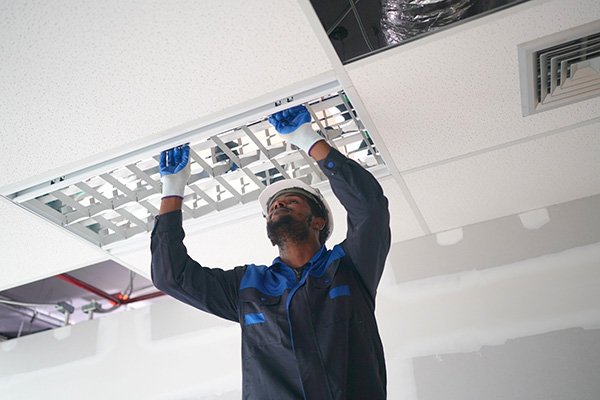Expert ceiling tile installation services for residential and commercial spaces. Our skilled professionals ensure precise, durable results. Transform your interiors with quality craftsmanship and efficient service. Contact us for a consultation.

Ceiling tile installation is a popular home improvement project that involves fitting tiles onto a ceiling grid to enhance the aesthetic appeal, acoustic properties, and functionality of a room. This process not only improves the look of a space but also provides various practical benefits such as noise reduction and energy efficiency.
Ceiling tiles are lightweight building materials that are used to cover ceilings. They come in various types designed for different purposes, including:
Acoustic Tiles: These tiles are specifically engineered to absorb sound and reduce noise levels within a space. They are commonly used in offices, classrooms, and auditoriums.
Decorative Tiles: These tiles focus on enhancing the visual appeal of a room. They come in various designs, patterns, and finishes to match different interior styles.
The first step in ceiling tile installation is to measure the area where the tiles will be installed. Accurate measurements are crucial to ensure you purchase the correct amount of tiles and materials. Once the measurements are taken, you need to choose the right type of tiles based on your needs and preferences.
Before starting the installation, gather all the necessary tools and materials. This typically includes ceiling tiles, a measuring tape, a utility knife, a straight edge, adhesive, a chalk line, and a ladder.
Use a chalk line to mark the layout on the ceiling. This helps in aligning the tiles properly and ensures a uniform installation.
Measure and cut the tiles to fit around the edges of the ceiling and any obstacles such as light fixtures or vents. A utility knife and a straight edge are typically used for this purpose.
Apply adhesive to the back of each tile and press it firmly onto the ceiling, following the marked layout. Ensure each tile is securely in place and aligned with the adjacent tiles.
Precision and patience are key to a successful ceiling tile installation. Here are some tips to help you achieve the best results:
Double-check your measurements before cutting any tiles to avoid mistakes.
Take your time to align each tile properly to maintain a uniform look.
Use high-quality adhesive to ensure the tiles stay in place.
Avoid common mistakes such as misaligning the tiles or using insufficient adhesive.
Ceiling tile installation offers numerous benefits, making it a worthwhile consideration for both homes and offices. From acoustic advantages to aesthetic enhancements, ceiling tiles can significantly improve a space in various ways.
One of the primary advantages of ceiling tiles is their ability to absorb sound, reducing noise levels within a room. This is particularly beneficial in environments such as offices, classrooms, and commercial spaces where noise can be a distraction. Acoustic ceiling tiles help create a quieter, more comfortable environment by minimizing echoes and noise pollution.
Example: In an office setting, installing acoustic ceiling tiles can greatly reduce the noise from conversations, phone calls, and office equipment, leading to a more productive work environment.
Ceiling tiles come in a wide variety of designs, styles, and finishes, allowing you to enhance the décor of any room. Whether you prefer a modern, sleek look or a more traditional, ornate design, there are ceiling tiles to match your aesthetic preferences. Decorative ceiling tiles can transform a plain ceiling into a stunning focal point, adding character and style to your space.
Another significant benefit of ceiling tile installation is the potential for improved energy efficiency. Ceiling tiles can provide an additional layer of insulation, helping to regulate the temperature within a room. This can lead to reduced energy consumption for heating and cooling, ultimately lowering your energy bills.
Ceiling tiles are relatively easy to maintain. They can be cleaned with a damp cloth or vacuumed to remove dust and dirt. In the event of damage or staining, individual tiles can be replaced without the need for a complete ceiling overhaul, making maintenance simple and cost-effective.
Installing ceiling tiles can be a cost-effective solution in the long run. Due to their durability and low maintenance requirements, ceiling tiles can save you money on repairs and replacements over time. Additionally, the energy efficiency benefits can contribute to long-term savings on utility bills.
The cost of ceiling tile installation can vary based on several factors, including the type of tiles, the size of the room, and whether you choose to hire a professional or undertake the project yourself. In this section, we will explore the various cost components and provide an estimate for ceiling tile installation in London, Ontario.
The cost of ceiling tiles can vary significantly depending on the type and quality of the tiles. Acoustic tiles, for instance, may be more expensive than basic decorative tiles. Prices can range from $1 to $10 per square foot.
If you choose to hire a professional installer, labor costs will be an important consideration. In London, Ontario, the average hourly rate for ceiling tile installation ranges from $30 to $60 per hour. The total labor cost will depend on the size of the room and the complexity of the installation.
Other expenses to consider include tools, adhesives, and any other supplies needed for the installation. These costs can add up, particularly if you need to purchase specialized tools or high-quality adhesive.
The total cost of ceiling tile installation will depend on the factors mentioned above. Here, we provide some example scenarios to give you an idea of the typical costs involved.
For a small room of approximately 100 square feet, the estimated cost breakdown is as follows:
Materials: $100 – $1,000
Labor: $150 – $300
Additional Costs: $50 – $100
Total Cost: $300 – $1,400
For a larger room of approximately 400 square feet, the estimated cost breakdown is as follows:
Materials: $400 – $4,000
Labor: $300 – $600
Additional Costs: $100 – $200
Total Cost: $800 – $4,800
Undertaking ceiling tile installation as a DIY project can save you money on labor costs. However, it requires time, effort, and a certain level of skill to achieve professional results. Here are some pros and cons to consider:
Pros: Cost savings, sense of accomplishment, flexibility to work at your own pace.
Cons: Requires time and effort, potential for mistakes, may lack professional finish.
Hiring a professional installer ensures a high-quality finish and efficient completion of the project. While it involves higher upfront costs, it can be worth the investment for those who lack the time or skills for a DIY installation. Here are some pros and cons:
Pros: Professional results, saves time and effort, expertise and experience.
Cons: Higher upfront costs, less control over the project, need to find a reliable contractor.
By understanding what ceiling tile installation entails, its benefits, and associated costs specifically in London, Ontario, you can make an informed decision on whether this home improvement project is right for you!
